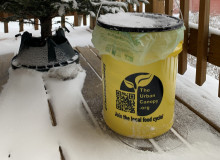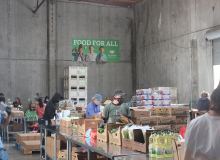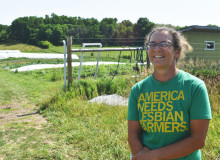Food
SUNY ESF
In this podcast we talk about the stigma against consuming insects in the U.S. and how we might overcome that stigma to reach new heights.
University of Chicago
Composting is a growing practice that diverts food waste from greenhouse gas-producing landfills; Chicago colleges provide a case study into how this practice can be implemented more broadly today.
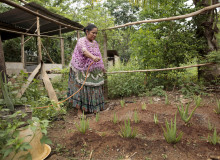
In 2015, in collaboration with Indigenous leaders and Indigenous youth, FAO identified 6 pillars of work and 2 focus areas—Indigenous women and Indigenous youth—as part of FAO’s goal of freeing the world of hunger and malnutrition (Photo courtesy of UN Women/Ryan Brown https://creativecommons.org/licenses/by-nc-nd/2.0/).
Planet Forward FAO Fellow | University of Oklahoma
Indigenous Peoples’ communities' challenges and priorities of “food security, food sovereignty, and health have accelerated and intensified during the COVID-19 pandemic,” according to Indigenous Peoples’ Liaison Mikaila Way.
Planet Forward FAO Fellow | University of Oklahoma
For many organizations, COVID-19 meant doors closed. Yet at one sacred, Native Hawaiian fishpond, community members worked to advance their efforts to reclaim the land, culture, and traditions of sustainable aquaculture.

(Photo courtesy of Keegan Houser/Unsplash - https://unsplash.com/photos/W6ZFtDLR27g)
Planet Forward FAO Fellow | University of Oklahoma
"Mo‘olelo," or storytelling, is embedded deeply in the Hawaiian culture. Now, groups of Native Hawaiians and allies are using it to destigmatize the traditional practice of fishponds and reunite with their roots.
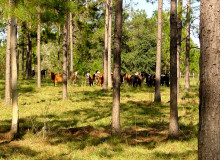
Cattle graze in silvopasture (Photo courtesy of The National Agroforestry Center/ https://creativecommons.org/licenses/by/2.0/?ref=ccsearch&atype=rich).
Planet Forward FAO Fellow | Franklin & Marshall College
Sustainable agriculture has an accessibility problem. One Virginia farmer has a vision to solve it.
Planet Forward FAO Fellow | Emerson College
Interest in sustainable farming practices is building, and while independent and governmental conservation organizations can be good resources for promoting ecological practices, farmers say that swapping information peer-to-peer works best.
Recipes for Food Security | Dollars and diversity: Why young farmers need investment, representation
Planet Forward FAO Fellow | Emerson College
Big Muddy Urban Farm minimizes some of the financial barriers that keep potential farmers from entering the industry, like low profit.
Planet Forward FAO Fellow | George Washington University
The city of San Francisco and local organizations innovated to serve food insecure populations during the pandemic. Can food initiatives have the infrastructure to be durable?
Planet Forward FAO Fellow | Emerson College
It's hard for new farmers to find affordable land to buy. A community of Iowans banded together to solve that issue for a farmer in their neighborhood.


